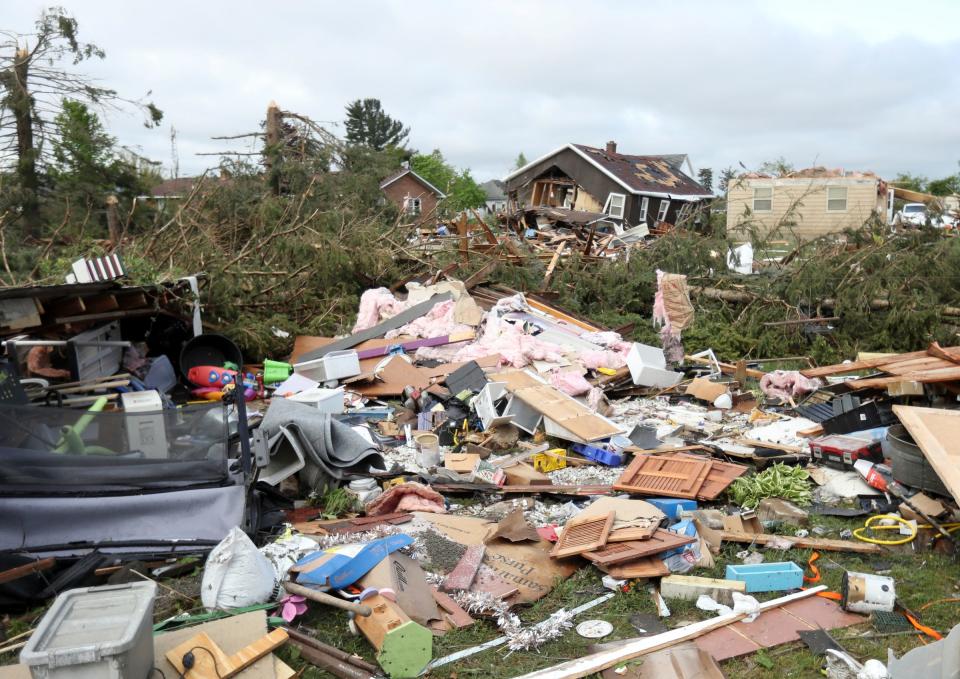Michiganders should take tornadoes more seriously after Gaylord, experts say
When a tornado ripped through Gaylord last Friday, it was unexpected. Northern Michigan isn't used to getting tornadoes at all, let alone such strong, devastating ones.
The rare EF-3 destroyed homes and businesses, and it killed two people and injured 44. It begs the question, can the Gaylord tornado be attributed to climate change?
According to three climate experts, it's hard to say — the science is new and there is not enough data to draw conclusions.
But that isn't to say scientists aren't worried about what the increasingly warmer atmosphere means for storms and tornadoes.
"We have to take tornadoes seriously in Michigan, more seriously than we used to," said Jonathan Overpeck, dean and professor at the University of Michigan School for Environment and Sustainability. "The big message from Gaylord is even in northern Michigan, when there's going to be severe storms. Check the radio and see what NOAA is saying ... those types of storms happen pretty quickly, and the impacts can be pretty lasting."
The atmosphere is warming, Overpeck said, which can lead to bigger thunderstorms. That in turn can cause bigger tornadoes. It also can lead to longer warm periods, which lengthens tornado season. Plus, there's some evidence of a geographical shift: Tornadoes are more frequently occurring in more northern areas, including Michigan, he said.
Twisters most frequently occur in Tornado Alley, which includes Texas, Oklahoma, and Kansas, said Perry Samson, professor of atmospheric science at the University of Michigan.
Samson, who has been caught in the middle of a twister himself, said the frequency of tornadoes seems to be on the rise. He's worried about the potential for more people to be exposed to tornadoes as they begin to touch down in more populated regions.
"We're seeing a shift to the east, more into Arkansas, Mississippi, Alabama, the frequency of tornadoes there seems to be on the rise," Samson said. "It is of great concern because those areas are more populated than, say, central Kansas. ... We are (also) seeing this somewhat troubling signal that when we have a tornado day, we get more tornadoes on those days. And we've had evidence we've had days with over 200 tornadoes in 24 hours."
More: Alert system gave Gaylord residents minutes to react before tornado's rampage
More: Here was the path of the Gaylord tornado that left two dead, 44 injured
With the possibility of more frequent and stronger tornadoes, Overpeck said it is "critical" for Michigan cities to be prepared with the proper infrastructure, places to hide, and a good warning system.
In some cases, with extraordinarily strong twisters, nothing can be done to save your car or your house, but a warning system can save your life.
"But when you get up to the EF-3 and above ... then it really doesn't matter what your house is, you're in trouble," Samson said. "And you can see in those damaged pictures, how some houses were picked up, and literally turn on their foundation, that should put just the fear of God in anybody that you could be in that situation, and that's why you want to be in the basement, that's your best protection."
Gaylord opts to use Code Red, an alert system that sends geographically targeted and time-sensitive information to residents via text, instead of sirens. It's the county's only method for communicating emergencies.
This system can be a double-edged sword — it reaches residents who may live outside the siren's range, but it ignores a subsection of the population who may not have phones or have them within arm's reach.
While it is important to be proactively prepared, there's no reason to live in fear, said Harold Brooks, senior research scientist at NOAA’s national severe storms laboratory in Oklahoma.

"Tornadoes, in reality, are a rare event anywhere," Brooks said. "It happens with a lot of things in human judgment, we tend to underestimate the probabilities or overestimate the probabilities of extreme events ... so a one in a several hundred-year event hit Gaylord, which may not be that bad of an estimate of the probability. It's really hard to tell the difference between a one in 500-year event and a one in a 50-year event ,.. they just don't happen often."
Michigan is often considered a refuge from the climate crisis, a place people will move as wildfires and droughts continue to ravage southwest states.
Overpeck said he believes Michigan can be that place, and the possibility of more tornadoes doesn't change that.
"It's a relative thing, and I am a strong believer that Michigan is a refuge (compared to) Southwest US where there's mega-drought going on," he said, noting Michigan has 80% of North America's surface freshwater in the form of the Great Lakes.
Part of preparing for climate change is thinking ahead, he said, and it's crucial to build infrastructure that can better withstand extreme weather events.
"It's really important to realize, nobody's a winner if we let climate change get out of control," Overpeck said. "The big thing here is, when we build infrastructure, build for the future, build for climate change, don't build for the past."
More: How Gaylord came together after a deadly tornado
Contact Emma Stein: estein@freepress.com and follow her on Twitter @_emmastein.
This article originally appeared on Detroit Free Press: Gaylord tornado shows why Michiganders should worry, experts say

